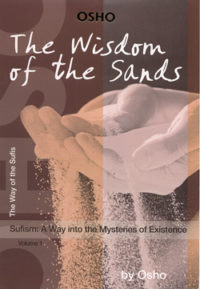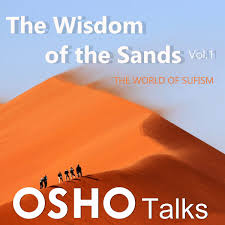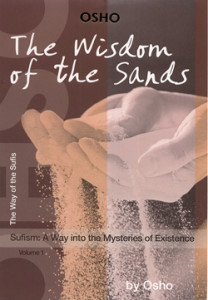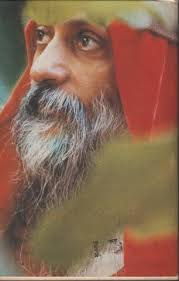
Sufisme: a Way into the Mysteries of Existence
It really needs COURAGE to go against this whole CROWD
“Whenever you see a really blissful man, the idea arises in you: “Has he gone mad?” because the so-called sane are never happy. Sanity has become almost synonymous with misery, long-face, sadness, seriousness. Sanity has become synonymous with a loaded feeling – one is dragging oneself somehow, and dragging for nothing, and there is nowhere to reach except death. Sanity has become synonymous with the idea that life is meaningless, that to be joyous one has to be a fool.

It really needs courage to go against this whole crowd of the world, this miserable crowd. Nobody knows ways of joy, nobody dances, nobody sings. And suddenly you burst into song! They all feel shocked: “Something has gone wrong.” They all start improving upon you, they all start advising you. They are altogether against you. You are dangerous! The fear arises in the mind of the crowd: “Who knows? You may be right.” The doubt arises. And if you are right, then they are all wrong. This is unacceptable. You have to be wrong; only then can they feel safe that they are right. Hence, they crucified Jesus. […]” the Wisdom of the Sands
A Weg in de Mysterie van het Soefisme
Het boek ‘The Wisdom of the Sands’ gaat over de wereld van de Soefi’s. Aan de hand van indringende verhalen wordt ons hun wijsheid duidelijk gemaakt. Vertrouwen, vanuit het hart leven en “let go” zijn hierbij de kernachtige onderdelen. De cover afbeelding geeft weer, dat er zo ontzettend veel tot ons komt. Het is echter de kunst om in het zand de goudkorrels te vinden.
De cover afbeelding geeft weer, dat er zo ontzettend veel tot ons komt. Het is echter de kunst om in het zand de goudkorrels te vinden.
Onze spirituele reis is vaak doelgericht, maar op zich is de reis al zo mooi en vol leerrijke ervaringen.
Het boek The Wisdom of the Sands is, vaak tweedehands, verkrijgbaar bij diverse boekhandels of als audiobook via internet.
DE MOED DIE NODIG IS…
‘Er is echt MOED voor nodig om tegen deze hele MASSA in te gaan’ is een van de kernthema’s in dit boek.
Osho legt uit:
‘Wanneer je een echt gelukzalige man ziet, komt het idee in je op: ‘Is hij gek geworden?’ want de zogenaamd gezonde is nooit gelukkig. Gezondheid is bijna synoniem geworden met ellende, een lang gezicht, verdriet, ernst. Gezondheid is synoniem geworden met een belast gevoel – men sleept zichzelf op de een of andere manier voort en het slepen is voor niets, want er is niets anders te bereiken dan de dood. Gezondheid is synoniem geworden met het idee dat het leven zinloos is, dat men om vreugdevol te zijn een dwaas moet zijn.’
JIJ BENT GEVAARLIJK…
‘Er is echt moed voor nodig om tegen deze hele massa in de wereld in te gaan, deze ellendige menigte. Niemand kent manieren van vreugde, niemand danst, niemand zingt. En plotseling barst jij uit in een lied! Ze voelen zich allemaal geschokt: ‘Er is iets misgegaan.’ Ze beginnen je allemaal te verbeteren, ze beginnen je allemaal advies te geven. Ze zijn allemaal tegen je. Jij bent gevaarlijk! Er ontstaat angst in de mind van de menigte: ‘Wie weet? Misschien heb je wel gelijk.’ Er rijst twijfel. Want als jij gelijk hebt, hebben zij het allemaal mis. Dit is onaanvaardbaar. Je moet het fout hebben; alleen dan kunnen ze zich veilig voelen dat ze gelijk hebben. Daarom hebben ze Jezus gekruisigd.’
Over de verhalen in ‘The Wisdom of the Sands’ zegt Osho:
Impression van the Wisdom of the Sands
In this collection of his commentaries on Sufi stories, Osho describes one of the stories within as belonging to “the very foundation of religious consciousness.” Deceptively simple, these tales of the Sufis have a deeper underlying significance, as Osho makes manifest through his beautiful and insightful commentary. This book is not for those who want entertainment, but for those who seek illumination.
In The Wisdom of the Sands is het verhaal over MOJUD, het leven vaneen soefi mysticus opgenomen, lees meer
Excerpt from: The Wisdom of the Sands
“The story that we are going to go into today is one of the greatest stories. It has that special flavor that only a Sufi story can have. It is incomparable. If you can understand this story, you will have understood the very secret of religion. If you can’t understand this story, you will not be able to understand religion at all.
“This belongs to the very foundation of religious consciousness. Without it there can be no religious transformation. So listen to this story as attentively as possible. Let this story sink into your being. This story can open a door, this story can become such a radical change in your life that you may never be the same again. But the story has to be understood very minutely, very carefully, very lovingly, because it is a strange tale.
“It is not just a story; Sufi stories are not just stories. They are not to entertain you. They are not to just give you an occupation. They are teaching devices. They indicate something, they show something, they point to something. They are pointers, they are arrows towards the unknown, fingers pointing to the moon. And remember this saying of the Sufis: Don’t bite my finger, look where I am pointing.
“It is very easy to be entertained by such stories, but that is not their purpose. You miss the point. They are reflections of the beyond. They say that which cannot be said and they try to express that which is inexpressible. They are not about ordinary life, they are not about the mundane world. They belong to the innermost search for truth, they belong to the center of your being. They are beautiful devices. If you simply pay attention, if you meditate on the story, parallel to the story something else will start revealing itself in your being. The story is on one plane, but the revelation is on another plane, parallel to it. Unless you start tasting that parallel revelation, remember, you have missed the point. And to miss the point is very easy. No intelligence is needed to miss the point; any stupid person can do it. But to understand, it will require great intelligence. So pull yourself together. Become integrated for these few moments. Listen as totally as possible, just become your ears. Be there. Something of immense value is being imparted in this story.” Osho, ‘The Wisdom of the Sands’
